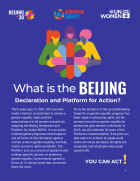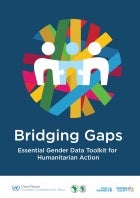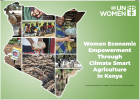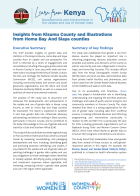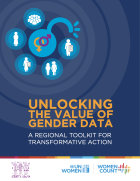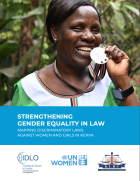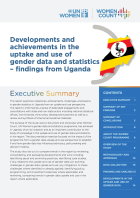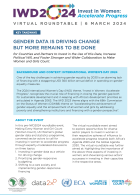Date:
Thirty years ago, in 1995, 189 countries made a historic commitment to advance gender equality, rights and the empowerment of all women and girls by adopting the Beijing Declaration and Platform for Action (BDPfA).
Date:
This toolkit is aimed at providing an easily accessible compendium of resources available for the production and use of gender data in humanitarian settings. It is tailored to build capacity and provide guidance to governments, civil society organizations (CSO), humanitarians working with data, information managers, managers, decision makers, statisticians, and users of gender statistics. The contained tools can be used in support of key humanitarian planning and operational processes, including advocacy, strategy and policy formulation, planning, resource allocation, monitoring, and evaluation.
Date:
This Care Framework highlights the context and challenges of women's unpaid care work in the West and Central Africa region. It also describes UN Women's approach to the care economy to address unpaid care within the context of the SDGs and the polycrisis in the region, and enabling gender equality and economic justice for rural and poor women.
Date:
The WEE-CSA Storybook showcases the success stories of over 2,400 women from Kitui, Laikipia, and West Pokot who have transformed their lives through climate-smart agriculture. Funded by KOICA and implemented by UN Women Kenya, it highlights the project's impact on livelihoods and gender equality while sharing valuable lessons learned. This collection celebrates resilience and aims to inspire further community upliftment for sustainable development in Kenya.
Date:
Kenya has demonstrated thought leadership in the use of administrative and citizen data for statistical purposes and harnessing official data to meet national priorities and SDG targets including on gender equality and women’s empowerment. This product highlights tangible achievements and lessons in improving access to and use of this data to influence policy and decision-making and improve the lives of women and girls in Kenya.
Date:
The United Nations Country Team System-Wide Action Plan (UNCT-SWAP) on Gender Equality Scorecard is an accountability framework that promotes improved planning, coordination, programming, and results for Gender Equality and Women Empowerment at the country level, tied to support for Member States in achieving the Sustainable Development Goals.
Date:
The UNCT-SWAP Gender Equality Scorecard showcases the UNCT’s dedication to promoting gender responsiveness and accountability in implementing Cooperation Framework and its operations, structures, and processes.
Date:
This report highlights some encouraging advancements. The information presented in this report is based on the latest available data (as of June 2024) on selected indicators in the global indicator framework for the Sustainable Development Goals.
Date:
This Toolkit is designed to support the enhanced use of existing gender data and statistics in policy, advocacy, planning, and accountability in East and Southern Africa. The production and use of gender statistics is a complex process that requires deliberate efforts to connect, incentivize, and influence.The strategies outlined provide guidance and user-friendly tips on how to influence, direct, and monitor the pace of progress towards achieving gender equality and women’s economic empowerment and using gender data and statistics.
Date:
The overall purpose of these briefs is to present an overview of the extent of care work and care needs vis-à-vis existing care services, systems, policies and infrastructure in East and Southern African Region. The rapid landscape analysis aims to demonstrate gaps in data and policy on care and make policy recommendations for recognizing, reducing and redistributing unpaid care work.
Date:
This product is related to the Be Like Tanzania series and part of an ongoing regional study. The study aims to showcase developments, achievements and lessons in the uptake and use of gender data and statistics in East and Southern Africa as part of experience-sharing and particularly south-south learning towards promoting the communication and use of gender data and statistics for policy- and decision-making to improve the lives of women and girls.
Date:
Notwithstanding the existence of various indicator frameworks and the Africa Gender Statistics Observatory, challenges regarding gender statistics data and capacity gaps remain within the AUC and across member states, underscoring the need for concerted efforts to expand on gender indicator frameworks and data availability, quality, and utilization. This assessment highlights the gender data and capacity gaps at the AUC and makes concrete recommendations how these can be filled.
Date:
UN Women and International Development Law Organization (IDLO), in partnership with the Kenya Law Reform Commission. Researcher/writer: Dr. Consolata Ngondi; Ms. Petronella Mukaindo
Date:
Uganda has demonstrated thought leadership in the use of administrative and citizen data for statistical purposes in its efforts to meet national priorities and address gaps towards achieving the Third National Development Plan (NDPIII) and SDG targets including on gender equality and women’s empowerment. This product highlights some of the achievements and lessons in improving the quality and use of this data to improve the lives of women and girls.
Date:
In this pre-IWD2024 roundtable event, Making Every Woman and Girl Count (Women Count), UN Women’s global gender data and statistics programme, convened sector actors to call for investing in women to accelerate progress through moderated discussions on: investing in gender data as a vehicle for driving change; prioritizing gender-responsive budgeting; shifting to a care society and implementing gender-responsive financing. The UN Economic Commission for Africa and the African Development Bank (AfDB) provided continental perspectives while global gender data alliance Data 2X provided a global view of the status of investment in gender data and its importance for gender equality and women's empowerment (GEWE).
Date:
The objective of the present study is to present an overview of the adjusted gender pay gap and labour-market inequalities in The United Republic of Tanzania. This is part of a larger 2023 UN Women study titled “Why Women Earn Less: Gender Pay Gap and Labour-Market Inequalities in East and Southern Africa.”
Date:
The objective of the present study is to present an overview of the adjusted gender pay gap and labour-market inequalities in Uganda. This is part of a larger 2023 UN Women study titled “Why Women Earn Less: Gender Pay Gap and Labour-Market Inequalities in East and Southern Africa.”
Date:
The objective of the present study is to present an overview of the adjusted gender pay gap and labour-market inequalities in South Africa. This is part of a larger 2023 UN Women study titled “Why Women Earn Less: Gender Pay Gap and Labour-Market Inequalities in East and Southern Africa.”
Date:
The objective of the present study is to present an overview of the adjusted gender pay gap and labour-market inequalities in Rwanda. This is part of a larger 2023 UN Women study titled “Why Women Earn Less: Gender Pay Gap and Labour-Market Inequalities in East and Southern Africa.”
Date:
The objective of the present study is to present an overview of the adjusted gender pay gap and labour-market inequalities in Malawi. This is part of a larger 2023 UN Women study titled “Why Women Earn Less: Gender Pay Gap and Labour-Market Inequalities in East and Southern Africa.”

